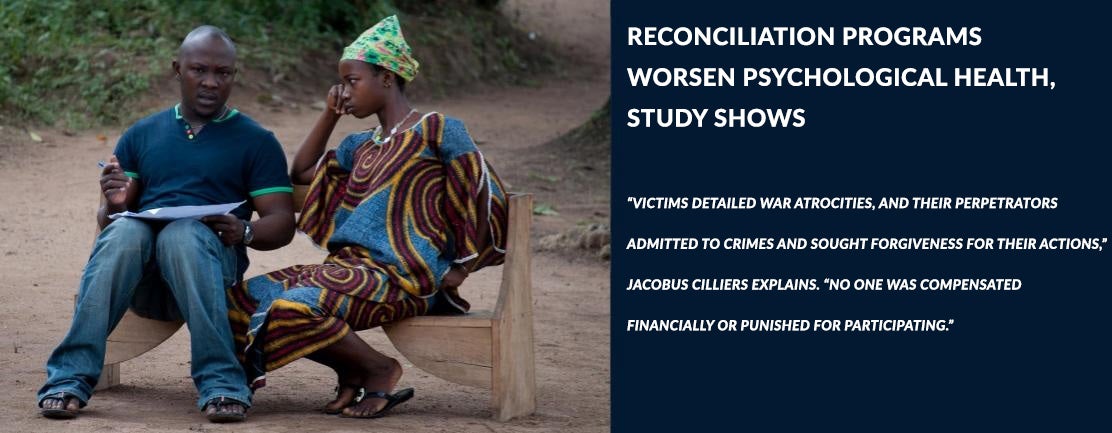
Post-conflict reconciliation promotes societal healing, but reduces victims’ psychological health, worsening depression, anxiety and trauma, according to a newstudytoday inScienceco-authored by a Georgetown professor.
In the aftermath of civil wars, many countries undertake truth and reconciliation efforts to restore social cohesion, notes co-author Jacobus Cilliers of Georgetown’s McCourt School of Public Policy.
These programs are premised on the fact that confronting wartime atrocities not only restore fractured relations and promote forgiveness, but can also aid psychological healing, he says.
COST OF FORGIVENESS
Before this study, which looked at perpetrators and victims of the civil war in Sierra Leone, Cilliers says no one knew whether these programs reached their intended goals, which include a perceived benefit to victims and their families.
“Our results show that, even though addressing wartime grievances can improve interpersonal relations, re-visiting the past can be psychologically traumatic,” he explains. “The cost of forgiveness is high.”
Cilliers, who conducted the study with Oeindrila Dube, a professor from New York University, and economist Bilal Siddiqi from the World Bank’s Development Research Group, evaluated a reconciliation program designed by a Sierra Leonean NGO that brought victims face-to-face with perpetrators in community forums.
A DECADE AFTER WAR
The forums in the study took place in 2011 and 2012, a decade after the civil war ended.
“Victims detailed war atrocities, and their perpetrators admitted to crimes and sought forgiveness for their actions,” the Georgetown professor explains. “No one was compensated financially or punished for participating.”
The research team, working with the nonprofit Innovations for Poverty Action to conducted an independent, randomized evaluation of the program with 200 villages, tracking nearly 2,500 people.
SOCIETAL HEALING, PTSD
“We recorded each person’s attitude toward their former combatants, their mental health and the strength of their social ties nine and 31 months after the program,” Cilliers explains. “Our study showed the program promoted societal healing, so that forgiveness of and trust in former perpetrators increased in the villages we studied.”
But the prevalence of clinical Post-Traumatic Stress Disorder was 36 percent higher in program villages than in comparison villages, where the prevalence of clinical PTSD was 8 percent.
“These results in no way undermine the need for reconciliation,” Cilliers says, “But they do suggest that policymakers need to find ways to mitigate the negative effects of confronting war memories when designing these programs – a fruitful avenue for future research.”
A summary of the study, along with a policy brief can be foundat: https://www.poverty-action.org/reconciliation.